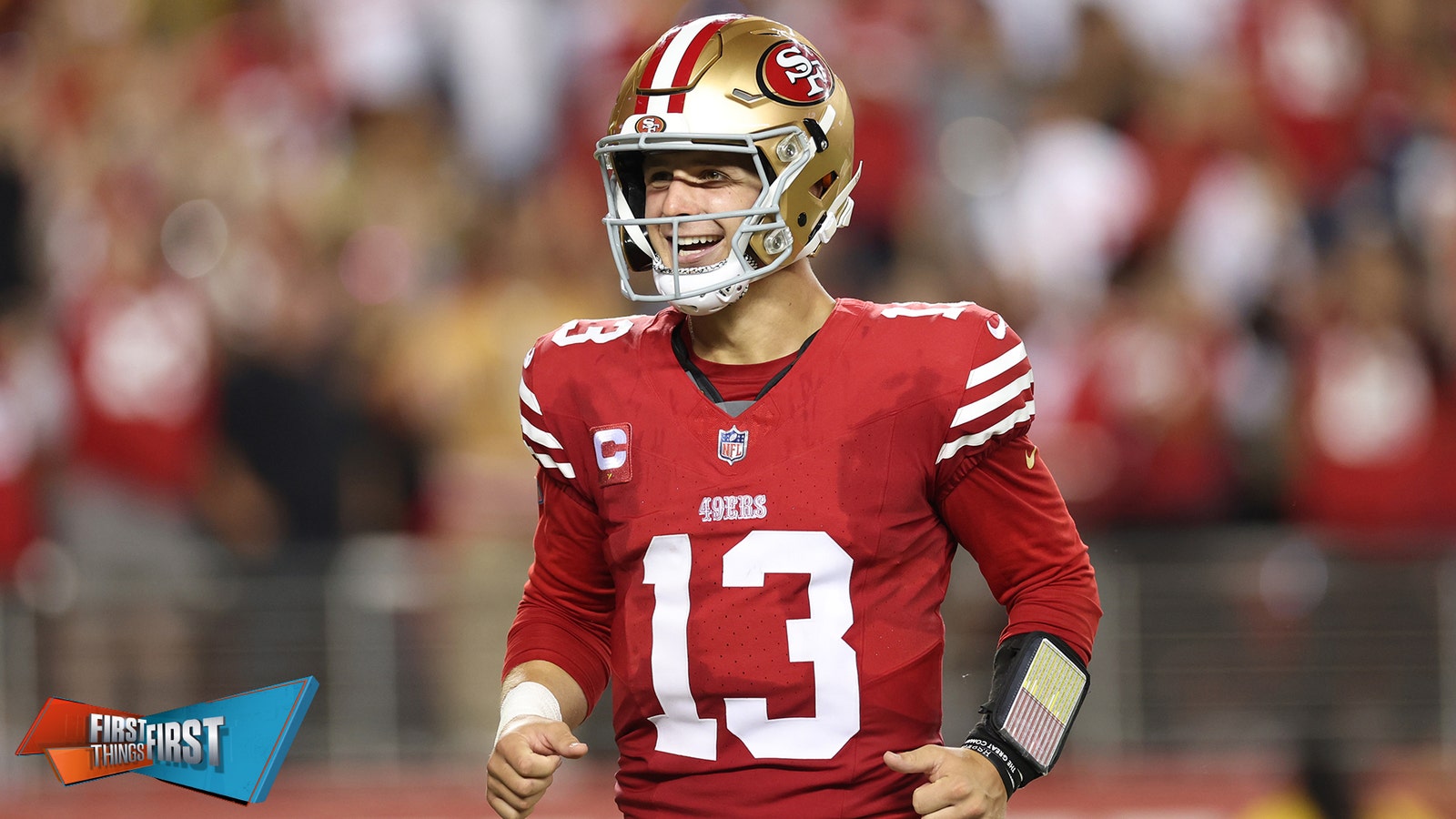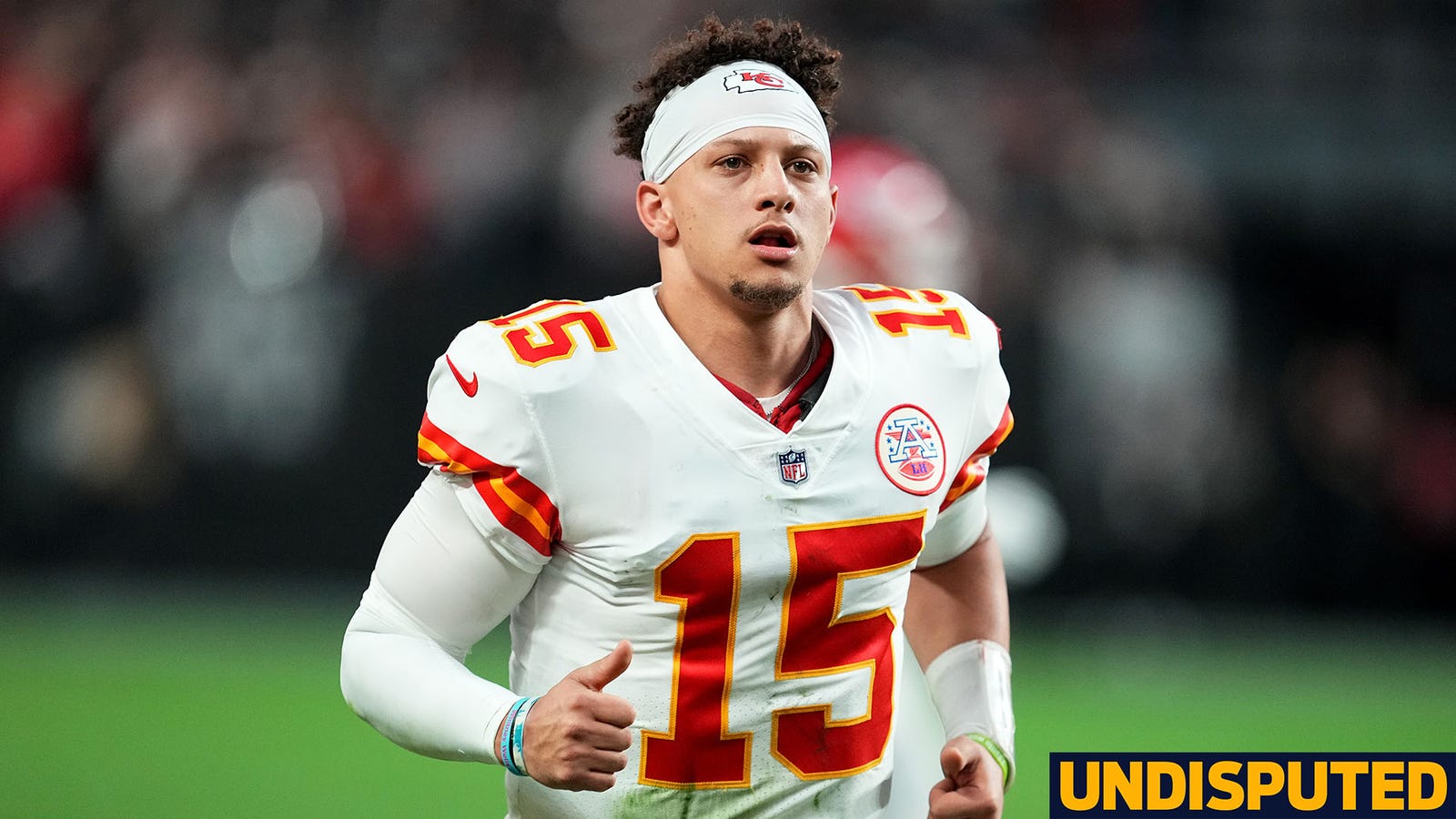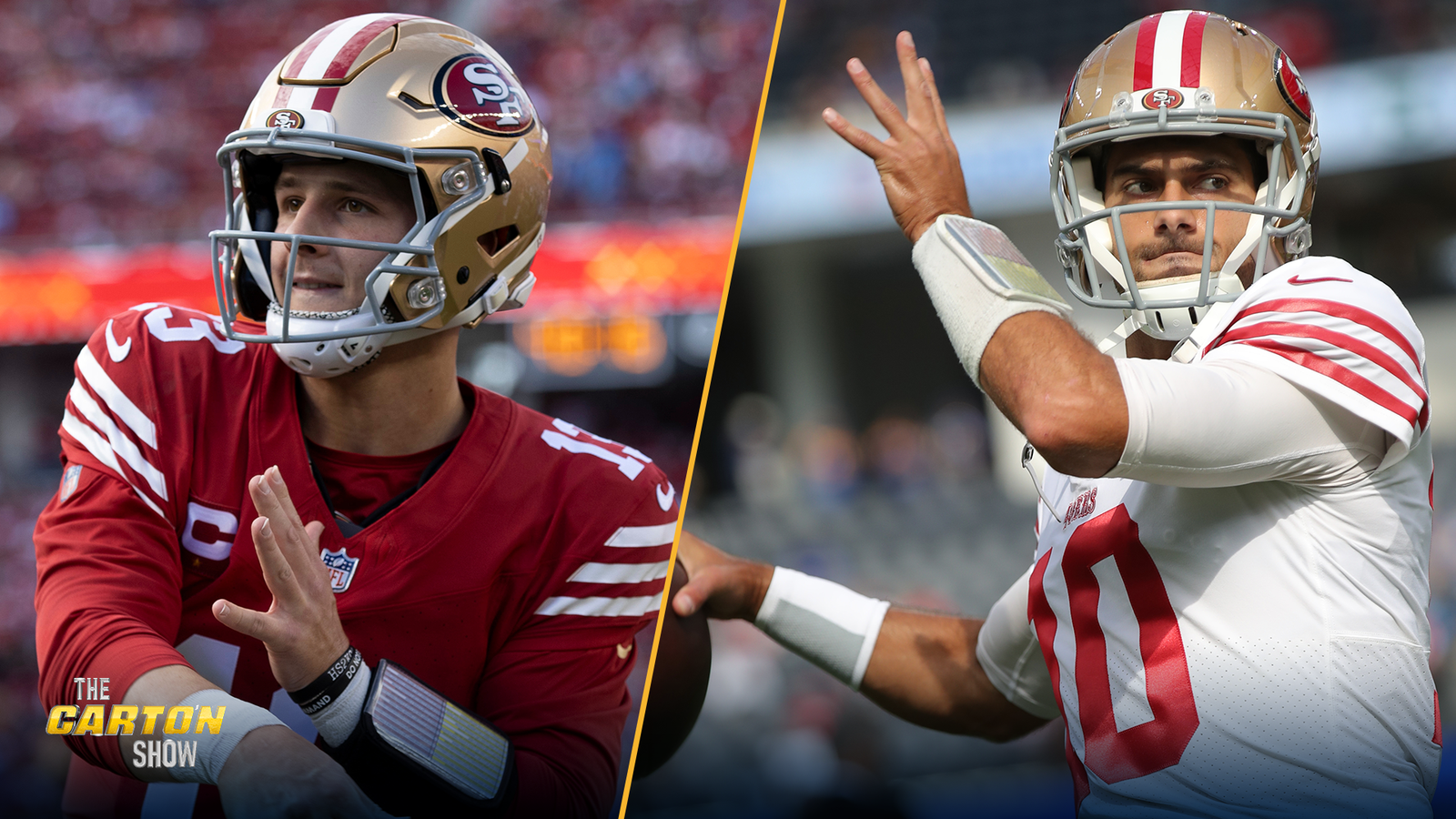
Why Patrick Mahomes is more of a game manager than Brock Purdy
It's impossible to know what someone means when they call a quarterback a "game manager."
It's a Rorschach test in the form of football jargon.
Is it an insult? Is it a compliment?
Yes. Both.
The problem with jargon like "game manager" is that it is innately ambiguous. Anyone who thinks about the phrase literally thinks of a quarterback who manages the game for four quarters. In that case, they're talking about a quarterback operating at the highest level. The perfect quarterback, in a sense. Anyone who sees the term on a more colloquial or conversational level is probably using it as an insult — a euphemism for mediocrity.
I'm here to tell you why Super Bowl LVIII will feature Brock Purdy, a game manager.
And Patrick Mahomes, another game manager.
We'll get to Mahomes, the biggest and baddest game manager in the NFL. (And statistics show that Mahomes has actually been the league's checkdown king.) But first let's talk Purdy, who is most often accused of game management and, as a result, has turned into a polarizing player to evaluate.
Because when people say it about Purdy, they're not being nice.
"It's such a weird conversation to hear the whole world talking about this," 49ers coach Kyle Shanahan told NFL Network on Monday during Super Bowl Opening Night. "In my opinion, there's no such thing as a great quarterback if you can't be a game manager. So, I don't get how being a system quarterback or a game manager is a negative. …
"You're a game manager, you run the system right and you can make plays. … Brock does all three of those things, so I don't get what we're talking about."
The critics might then investigate, at great depth, those three things that Purdy does. How big are those plays? How gutsy can Purdy get while continuing to execute at a high level?
Just to make a mockery of the whole conversation about game managers, I want to make sure we take a look at what former 49ers and Chiefs quarterback Alex Smith said about Purdy during a film breakdown on ESPN.
"I can tell you as the unofficial president of the game manager club, he's not allowed in," Smith said during a pregame show for the NFC Championship Game.
In other words, Smith believes the "game manager" moniker is an insult. And he thinks Purdy is undeserving of that criticism. So in a matter of days, we see the two definitions at work.
What exactly does Smith see in a QB who's a game manager?
"He's conservative with the football. He's not aggressive. He's not a difference-maker," Smith said on ESPN.
Smith and Shanahan might not agree with how they define a game manager, but they do agree on the caliber of Purdy's play. Purdy is making big plays and winning games for the 49ers. (He's not just riding the shoulder pads of his impressive skill players.) Smith and Shanahan agree that Purdy is the kind of quarterback San Francisco wants running its offense.
"I've got to be honest with you," Smith said, "I've been frustrated all week with all this talk of ‘Brock Purdy's just a guy,' that he's just average and that he's just a product of this great situation. It couldn't be further from the truth."
Smith pointed out multiple Purdy throws that were aggressive or gutsy or clutch or even game-winning. They ranged from a pinpoint pass to George Kittle in triple coverage against the Packers to a backyard scramble where Purdy eluded rushers and managed a touchdown to Brandon Aiyuk against the Commanders to a technically savvy dropback where Purdy threw the backside post, a route not typically thrown because of its high degree of difficulty, against the Detroit Lions.
Yes, it's true the 49ers offense provides an optimal situation for a young quarterback like Purdy.
That's why people insult him. It's not just that he entered the league with an underwhelming stature (6-foot-1, 210 pounds), arm strength and college stats (3,188 passing yards, 19 TDs, 8 INTs as a senior at Iowa State). It's that it's hard to separate his successes from those around him.
He has the top running back (Christian McCaffrey), the most complete tight end in the NFL (Kittle) and a top-five receiving corps (Aiyuk, Deebo Samuel).
Shanahan's scheme has also provided career-best seasons for quarterbacks. Quarterback Jimmy Garoppolo, who has since seen his career decline precipitously, also took the 49ers to a Super Bowl (where he flopped). Shanahan managed to scrape by with objectively bad quarterbacks in Nick Mullens and C.J. Beathard. Going back to what Shanahan did with the Falcons, Matt Ryan never played better than when the 49ers coach was his OC. Shanahan's scheme is magic.
It makes evaluating Purdy harder — even if he is headed to the Super Bowl. The good news for the 49ers, whose evaluation of Purdy is the only one that really matters, is that Purdy is making one of the smallest salaries in the league after San Francisco drafted him with the final pick of the 2022 NFL Draft. The Niners have him on that contract through 2025. That's plenty of time to figure out whether Purdy is catalyzing this offense — or capitalizing on the support.
But while we think of Purdy and Mahomes as operating on two totally different planes, their games have been more similar than you'd think.
Heck, Purdy seems to be checking the ball down less often than Mahomes. Even with Kittle and McCaffrey, Purdy recorded 151 passes to his running backs and tight ends, the ninth most in the NFL, per FOX Sports research. Mahomes recorded 210, the most of any QB.
You read that right: Mahomes (not Purdy) is the Checkdown King of the NFL.
Purdy is pushing the ball downfield, too. When it comes to big-time throws in the regular season — a stat Pro Football Focus defines as a pass with excellent ball location and timing, generally thrown further down the field and/or into a tighter window — Mahomes had 25 (tied for 12th) and Purdy had 27 (tied for 10th).
What is clear from my vantage, however, is that Mahomes is the greatest game manager in the game. This year, more than ever, Mahomes is a game manager. (Just look at those stats above!)
Even he is willing to admit it.
After the AFC Championship Game in January, when the Chiefs beat the Ravens, Mahomes discussed how his defense helped get him to the Super Bowl.
"Whenever they're rolling like that, I have to kind of manage my game," he said. "That's stuff that I've learned throughout the season: Even if we're not having the success that I want to have, [if] the defense is rolling and getting stops, just take the safe choice, get the ball out of my hand, don't turn the ball over and let's go win a football game."
The idea that Mahomes is a game manager — he almost titled himself as one — destroys everything we know about him. He's the guy who throws no-look passes. He's the guy who's working on a behind-the-back pass. He's the guy who has completed passes with his left hand and threw his first touchdown underhanded. His career has been all about exceptionalism, particularly in attempting and completing throws that no one else in the history of the NFL could make.
And yet this year, he's more of a game manager than ever. That's in part because of how the Chiefs assembled the team around him. Mahomes has a good offensive line and a strong running back in Isiah Pacheco. While he isn't without weapons in the passing game (see: Taylor Swift's boyfriend), Mahomes doesn't have a true WR1. The Kansas City skill players pale in comparison to what San Francisco boasts.
[READ MORE: How the Chiefs overcame an underwhelming WR group to reach Super Bowl LVIII]
But here's the thing: Mahomes truly manages the fourth quarter.
This isn't to say Purdy doesn't. Shanahan's 49ers were 0-30 when trailing by five or more points entering the fourth quarter before Purdy ended that losing streak against Green Bay in the divisional round. And then the 49ers came back from a 17-point halftime deficit against Detroit the following week.
But Mahomes is just different. He manipulates football games like he sees The Matrix's code. Just look at his completion to Marquez Valdes-Scantling on third-and-9 with 2:19 left in the game against the Ravens. It was as courageous and well-executed as throws get. A 32-yarder. And it was crucial in managing — and effectively ending — the game.
That fourth quarter is when quarterbacks prove themselves. Game managers (the insulting label) can't hang in the fourth. Look at Kirk Cousins, who historically wilts under pressure. True game managers (the complimentary label) figure out how to keep control in the final 15 minutes. Because that's where it's most important.
It's how Mahomes took over the Super Bowl last year. It's how he has chipped away at leads or held onto leads for the better part of his career. It's how he has not missed an AFC Championship Game since taking over as starter.
Former Chiefs quarterback Chad Henne, who was the backup in K.C. for five years, said that he was in Alex Smith's game-manager club. Henne provided more context for the definition, particularly as it pertained to Purdy and Mahomes.
"I would even put myself in [the category] when I was starting," Henne said about being a game manager. "It's that you need the game — not to go perfect — but you need help. Whether it be the run game, some calls need to go your way. … There's always going to be those quarterbacks that need something or someone to help them throughout that process."
Henne added: "I would count on a single hand right now [the number of] quarterbacks that really take over a game and just dominate you for four quarters. So when I say that, I'm saying like Aaron Rodgers and, obviously, Patrick right now. And that might be it."
What if Purdy wins on Sunday? Would that prove he's one of those guys — that rare breed of dominant QB? Maybe not. Even after a Super Bowl victory, some folks will remain dubious of Purdy. Some called Tom Brady a game-manager after he'd won three Super Bowls, after all.
The point is, game manager isn't a dirty term. It's just used in the wrong ways. Mahomes is managing the game better than he ever has, and with fewer weapons than he's ever had.
It's something Purdy will have to aspire to. Because he won't have all these weapons forever.
Prior to joining FOX Sports as the AFC East reporter, Henry McKenna spent seven years covering the Patriots for USA TODAY Sports Media Group and Boston Globe Media. Follow him on Twitter at @henrycmckenna.













